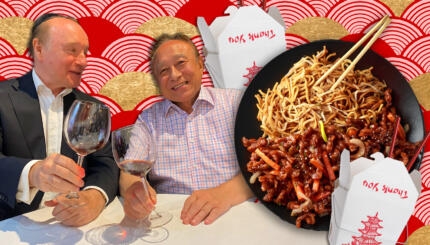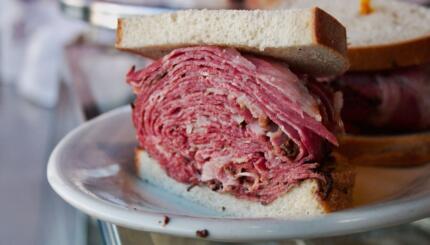For the past three years on Thanksgiving Day, people from our community have come together to make sandwiches to take to a local food pantry, less than 15 minutes from where most of our folks live. It all began because I was not hosting Thanksgiving dinner that year, and wanted to do something with my children in the spirit of Thanksgiving, ON Thanksgiving. The sandwiches we make are distributed on Thanksgiving Day and the Friday after, and with our delivery of nearly 500 sandwiches this year, the families who came for a Thanksgiving meal at The Mercy Inn were able to take several sandwiches home with them, potentially their only food over the weekend.
Our community, Makom NY, is a new model for Jewish community. The “new” piece means we don’t do things just because it has always been done that way, but rather because it makes sense; because it enriches our lives and the lives of the people in our greater community; because it allows all of us to flourish.
In many communities across the country, people gather together the week prior to Thanksgiving in prayer and song, often in an interfaith service. Though these services are typically lovely and ‘feel good’, I was never convinced that they actually spoke to the Jewish piece of gratitude, and I’m not sure they helped us to flourish as much as we are able. Between the balance of the different religions and the politics of the local officials, these services were often more about ‘what you were supposed to do’ than what was reaching people in their gut.
We are trying to look at life through new glasses. Thanks to CLAL and the VIA Institute, I was part of a Flourishing Project where we looked deeply at positive psychology and how we, as Jewish leaders, can allow Judaism to help us flourish, daily. Our mission now is to help people flourish as human beings, with Judaism as the vehicle to flourishing.
What does that look like? This year, it means sandwiches trump services. Instead of getting dressed up the week before the holiday for a Thanksgiving service that has typically low participation and is not always a vehicle to living a positive, good, meaningful life, we gather in our jeans, in our family’s living room, wash our hands, put on the gloves and get to work. This year there was even a wait list to come to the program. (Safety first, but next year we may need a larger space). We made sure to discuss where the sandwiches were going, the issues of poverty and hunger in our community, and the many mitzvot we were fulfilling by coming together.
The result? People wanted to know what was next, and could they help us plan more. The result? Our teens gathered together just one week later to make casseroles and lasagnas (18 large ones to be exact) to bring to this same food pantry.
One more lesson. The food pantry specifically requested that we bring bologna and cheese sandwiches, for they are easy to keep, and have more protein. Though I don’t eat bologna and cheese, nor would we ever serve it at a community event, we made bologna and cheese sandwiches, and it was a very ‘kosher way’ to spend our Thanksgiving day.
In the future, we may decide there is a better or different way to help people flourish, to let Judaism be that guide to flourishing. Some of our folks want to actually be in the food pantry on Thanksgiving and serve meals to those in need, but our families with younger children are not allowed to do this. And we may decide to offer both sandwiches AND services, because different people flourish in different ways, and different vehicles toward finding good and joy and contentment in this world, functioning in a positive and beneficial way.



